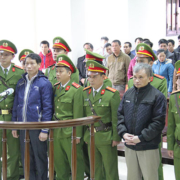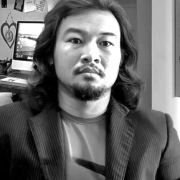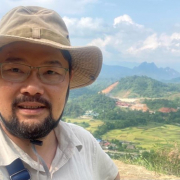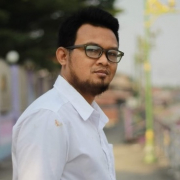Vietnam Free Expression Newsletter No. 31/2024 – August 8-14
Greetings from Project88. We bring you news, analysis, and actions regarding human rights and civil society in Vietnam from August 8-14.

This week, Project88 released a new report, Apocalypse soon? Vietnam’s unjust energy transition, on Vietnam’s G7-funded energy transition. Under the arrangement, called the Just Energy Transition Partnership (JETP), nine rich governments committed to mobilize $15.5 billion in funding. In return, Vietnam promised it would phase out coal and consult NGOs and the media when making decisions to ensure the transition is implemented in a just manner. Our report concluded that all parties have failed to live up to their sides of the deal.
The rich governments funding Vietnam’s energy transition have only mobilized a fraction of the pledged money, and, instead of providing grants to the Vietnamese government, have committed the funding in the form of commercial loans.
Vietnam, for its part, has not phased out coal. Rather, the government has decided to prioritize energy security over the transition, opening new coal mines and dramatically increasing imports of coal. Further, instead of ensuring the public had a voice in key decisions about the transition, the government has effectively criminalized activism on energy policy by arresting six leaders of the country’s climate change movement, while criminalizing all efforts to influence policymaking and monitor the country’s compliance with international agreements, even by government insiders.
Our report attempts to shine a critical spotlight on energy transition deals that are being promoted by rich countries as the solution to climate change in the developing world.
READ THE REPORT HERE
In other news this week, blogger Nguyen Chi Tuyen (Anh Chi) was sentenced to five years in prison. Y Quynh Bdap’s trial continues next week. A former political prisoner was summoned for questioning. And while former top cop To Lam receives well wishes on his new position as general secretary, a story analyzing Vietnam’s deteriorating human rights record makes the front page of the Washington Post, featuring data and commentary from Project88.

As Vietnam tightens leash on criticism, scores are jailed and exiled. The Washington Post; 2024-08-14. Vietnam’s government has been carrying out its most intense crackdown on critics in decades, jailing droves of activists, lawyers and journalists and driving even more into exile, according to human rights groups and security analysts. Organizations that developed over the past three decades to support free speech and hold the government accountable have been “completely decimated,” said Ben Swanton, director of the 88 Project. Independent publishing houses, journalist associations, think tanks and nonprofits have closed in quick succession, outlawed by the government or shuttered by leaders fearing arrest. “There’s no one left inside able to put up any organized resistance,” Swanton said.
HUMAN RIGHTS & CIVIL SOCIETY
Political Persecution

Nguyen Chi Tuyen
Nguyen Chi Tuyen, also known as Anh Chi, was sentenced to five years in prison for “making, storing or distributing information, documents and items aimed against the state of the Socialist Republic of Vietnam” (Article 117) on August 15 in Hanoi. Only his wife and lawyers were allowed in the courtroom. One of Tuyen’s lawyers said that he maintained his innocence at trial and now has only two weeks to decide if he wants to appeal.
Nguyen Chi Tuyen is one of the most well known Vietnamese human rights bloggers, amassing nearly 100,000 followers on his YouTube channel “Anh Chí Râu Đen.” Of Tuyen’s impact, Bennett Murray, former bureau chief for DPA (the German press agency) in Hanoi, said: “I think he spoke to people on a very individual level, not just sort of trading stories and ideas with fellow travelers, but actually reaching out to people on social media and really talking to the people who …. people who have a need to hear sort of alternative takes on the way things are in Vietnam and of the Communist Party.” Read more in Who is Anh Chi? And watch Murray speak about Tuyen’s motivations and legacy in the video clips below.
Anh Chi’s work — he was a generalist
“He loves his country. He is not violent.”
“We’re really proud of the work you’ve done.”

Y Quynh Bdap
The extradition hearing for Y Quynh Bdap began in Bangkok on Aug. 6. A co-founder of Montagnards Stand For Justice, Bdap is accused by Vietnam of “terrorism” activities. He was arrested in Thailand on June 11 after meeting with Canadian Embassy staff regarding resettlement. Bdap was not allowed into the courtroom for the hearing but had to attend via teleconference due to unknown “security concerns” raised by Vietnamese representatives. Bdap’s hearing continues on Aug. 19.

Tran Hoang Phuc
Tran Hoang Phuc‘s mother, Huynh Thi Ut, reported that Phuc was summoned again on July 30, but this time by the Office of Prosecution (Procuracy) in Ho Chi Minh City instead of by the Tan Binh Police. On June 29, 2017, Phuc, a student activist, was detained in Hanoi by a group of non-uniformed officers and taken to a police station for questioning for hours before he was taken back to his rental home and read a warrant of arrest. Phuc was later sentenced to six years in prison based on Article 88 (anti-state propaganda) and was released in June 2023. Project88 is monitoring the situation and will update with the latest information.
Prison Conditions

Nguyen Nang Tinh
Nguyen Nang Tinh‘s wife, Nguyen Thi Tinh, said that Tinh told her in a call home that he was still having pain in his knee joints even though he had been taking various types of medication and eating food meant to relieve the symptoms. However, Tinh has not had a medical exam to determine which exact medication is needed.


Luu Van Vinh and Huynh Minh Tam
Four families joined each other to visit their loved ones imprisoned at Gia Trung Prison in Gia Lai Province on July 31 and August 1. They are family members of Luu Van Vinh (serving 15 years), Huynh Minh Tam (9 years), Nguyen Thi Xuan, and Nguyen Doan Quang Vien. The group chose to visit on the last day of the month so that they could turn around and visit again the next day since by law they’re only allowed one visit per month. Many families choose to do it this way to save money and time due to the long distances they have to travel, even though it means that they essentially can only see their loved ones once every two months — but for two days in a row.

Pham Van Troi
Former political prisoner Pham Van Troi, released on July 30 after serving a seven-year sentence, provided Project88 with some details of his time in jail. Arrested on July 31, 2017, Troi was held in temporary detention center B14, in Hanoi, for nearly 12 months. In the beginning, he said he was interrogated twice a day, including Saturdays and Sundays. The sessions were recorded on video and streamed directly to other parts of the prison; sometimes he was notified of this, sometimes not. He was held in a two-person cell, each person having a 2 square-meters space. He was let out only for interrogation sessions.
On July 5, 2018, he was transferred to Nam Ha Prison, also in Hanoi. Troi was held in a four-person cell about 12 square-meters with one shared open toilet next to a bed. The cell had a camera monitor and audio recorder. The only meat they were given was pork; a lot of times it was old, discolored, and smelled. Drinking water came from a well; the water had a nasty smell. Troi and other prisoners suspect that water from this well was unfit to drink.
Troi reported he was healthy before his arrest. One year after his detention, he began to suffer from headaches, joint pain, nerve pain, an uneven heartbeat, and severe low blood pressure. He noted that many prisoners at Nam Ha prison experienced low blood pressure, even some who had high blood pressure before they were incarcerated. Troi himself had to go to the clinic several times a week due to his conditions. Twice he was sent to the Ha Nam Hospital (2021 and 2023). However, he was only examined and then sent back to prison, in handcuffs, with some medication.
Political prisoners could not possess pen or paper. They could only request these on Tuesdays, and if approved, they would be given two pieces of paper on Fridays to write one of the following approved items: letters home, formal requests, re-education activities. There were times when an approved letter or request was never sent. In fact, in the beginning of his imprisonment, none of Troi’s letters home were sent; the situation only changed after he made repeated complaints.
Troi and other prisoners also suspect that there is some strange type of device above the roof of their cell that emitted an unusual humming electrical sound, causing headaches. The sound could be clearly heard at night; they did not hear the sound during the day. The prisoners think that this noise contributed to their medical problems.
VIETNAM IN THE WORLD
Visit to Vietnam: Report of the Special Rapporteur on the right to development, Surya Deva. UN General Assembly; 2024-07-8. The Special Rapporteur on the right to development, Surya Deva, conducted a visit to Vietnam from 6 to 15 November 2023. In his report on the visit, Deva recommended that the Vietnamese government engage “in meaningful consultation with communities and individuals, in particular groups in vulnerable situations, when implementing green growth, climate change and environmental policies, for a just transition.” Thus far, this has not been the case. In addition, Deva recommended that Vietnam “ratify the ILO Freedom of Association and Protection of the Right to Organise Convention, 1948 (No. 87).” Unfortunately, in Directive 24, Vietnam’s senior leaders said that they have no intention to comply with ILO Convention No. 87, even if the country does ratify it.
Report of the Working Group on the Universal Periodic Review. Human Rights Council. 2024-06-21. During the interactive dialogue, 133 delegations made statements. Recommendations made during the dialogue are to be found in section II of the present report.
Vietnam’s newly appointed party chief set to visit China next week. Reuters; 2024-08-12. Vietnam’s top leader To Lam will visit China next week in his first foreign trip since his appointment as general secretary of the ruling Communist Party earlier in August, three officials familiar with the matter told Reuters. The move would confirm the close ties between the two communist-run neighbors, which have well developed economic and trade relations despite occasionally clashing over boundaries in the energy-rich South China Sea, a crucial commercial waterway that Beijing claims almost in its entirety—irking several countries in the region.
ADDITIONAL NEWS AND ANALYSIS
In Vietnamese: Việt Nam: Cạnh tranh nội bộ khiến lãnh đạo lơ là trước các thách thức của đất nước?. BBC Vietnamese; 2024-08-12.
What Will To Lam’s Foreign Policy Look Like? The Vietnamese; 2024-08-13. President To Lam has been elected the new general secretary of the Vietnamese Communist Party (VCP) after an extraordinary plenum of the Central Committee, cementing his position as the country’s most powerful politician. All eyes are now on To Lam, the first person to hold both of the most powerful positions in Vietnamese politics since the late General Secretary Nguyen Phu Trong in 2021. As Vietnam faces tremendous challenges across different areas, from a slowing economy and increasing social issues to balancing international relations, observers are keen to see what To Lam’s foreign policy will look like.
Vietnam signals action to tackle ‘negative impact’ of Falun Gong. RFA; 2024-08-09. Members of the Falun Gong spiritual sect are having a negative impact on Vietnam’s political security and public order and authorities will act to discourage participation in its activities, Vietnamese state media reported. The movement, founded in China in 1992, has been banned in China and is closely monitored in Vietnam. Vietnam’s Ministry of Interior said it planned to take a strong stance against followers of the sect and would act to prevent the formation of “illegal organizations”, according to a report on Tuesday in the Capital Security page, a special publication of the People’s Police newspaper.
Analysts: Vietnam’s new leader promises reform, but it won’t be easy. RFA; 2024-08-12. If To Lam really wants to tackle the country’s problems, he should repeal Article 4 of the Constitution, which was written in 1992 and established the Communist Party of Vietnam as the country’s leading force, said Tran Anh Quan, a young activist from Ho Chi Minh City. The biggest obstacle to moving the country forward is the Communist Party’s one-party rule, which doesn’t allow for a political opposition or for freedom of speech, he said. Removing Article 4 would allow multiple parties to compete in a fair and transparent manner, he said.
© 2024 The 88 Project








